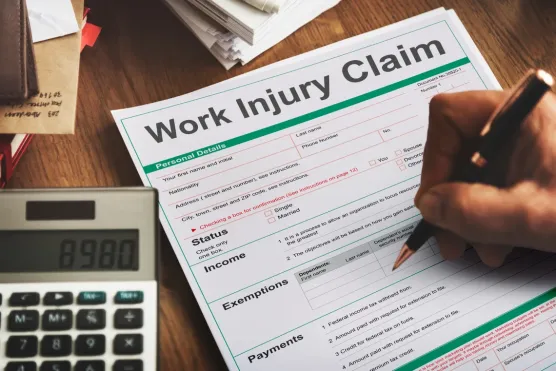How is State Worker's Compensation Insurance Funded?

What is Workers' Compensation Insurance?
Workers' compensation insurance is a necessity for businesses that employ individuals, providing essential coverage for employees who suffer work-related injuries or occupational diseases. This form of insurance helps covers all medical care for an injured workers and a percentage of loss wages while the employee is unable to perform their duties, even if disabled for the rest of their life. In the unfortunate circumstance of an employee's death due to work-related injuries, workers' comp also provides statutory death benefits.
Most states require workers’ compensation coverage, depending on the industry and number of employees a company has. In some states you may be able to self-insure, but the process of becoming self-insured is daunting. Each state has its own workers' compensation laws and benefits. Understanding your state's specific requirements is crucial to ensure compliance and provide adequate protection for your employees.
The significance of workers' compensation insurance cannot be overstated. It provides financial assistance to injured employees and protects businesses from being sued due to workplace injuries. This dual benefit helps maintain workplace harmony and ensures that both employees and employers are protected under challenging circumstances.
You Also Get Info About:
Why is Workers' Compensation Important?
The modern workplace can pose various hazards, making workers' compensation an essential safety net. This insurance ensures that employees who are injured or fall ill due to their jobs are not financially burdened by medical expenses or lost wages. It is particularly important in high-risk industries where the potential for workplace injuries is significant. By covering the expenses associated with workplace injuries, workers' compensation helps maintain employee morale and productivity.
Furthermore, workers' compensation is also important from a legal standpoint. It provides a form of liability protection for employers. By accepting workers' comp benefits, employees generally waive the right to sue their employer for the injury. This arrangement helps avoid lengthy and costly legal disputes, allowing both parties to focus on recovery and business continuity.
Types of State Workers' Compensation Funds
State-run workers' compensation fund systems come in two primary forms:
Monopolistic State Funds
Monopolistic state funds are government-run programs that are the sole source of workers' compensation insurance within certain states. Businesses in these states must purchase policies from the fund and do not have the option to purchase workers' compensation insurance from private insurers. This system simplifies the process for businesses but limits their options to potentially more competitive and tailored insurance offerings available on the open market.
Monopolistic state funds are in Ohio, North Dakota, Washington, and Wyoming. Employers in these states must navigate different rules and can only obtain coverage for employees working in these states, there is no coverage for out of state work. Understanding these unique requirements is crucial for compliance and optimal coverage.
These state funds do not include an important coverage typically packaged with workers’ compensation policies in other states, Employers’ Liability. Workers’ compensation is a no-fault coverage, benefits are paid regardless of fault for the injury or disease. Employers’ liability coverage provides defense for the employer and payment of employee lawsuit settlements. It covers circumstances and damages not addressed by workers’ compensation coverage.
Competitive State Funds
Competitive state funds, on the other hand, operate in states where businesses can choose their workers' compensation insurance provider from either state funds or private insurers. This system promotes competition among insurers, potentially lowering premiums and improving service quality for businesses. States like California, Colorado, Texas, and Arizona offer competitive funds, providing businesses with more flexibility and choices for workers’ compensation.
These competitive funds often serve as a safety net for businesses unable to get insurance from private carriers due to the high risks and large claim payouts associated with their operations. They ensure that all businesses, regardless of risk, have access to workers' compensation insurance, which is crucial for both employee welfare and business compliance.
Funding of State Workers' Compensation Funds
State workers' compensation funds are primarily funded through premiums paid by the businesses they insure. These premiums are calculated based on the risk associated with the covered employees' work activities. Higher-risk industries generally incur higher premiums due to the greater likelihood of filing claims. This funding model helps ensure that the fund can cover the costs of claims while managing its financial liabilities effectively.
State funds may generate revenue through investments in addition to premiums. These investments help offset the costs of running the insurance program and can lead to lower premiums for businesses over time. Effective management of these funds is important for maintaining their solvency and assuring that they can meet their obligations to the employees covered.
Differences Between State Funds and Private Carriers
Choosing between a state fund and a private carrier can significantly impact a business's workers' compensation costs and services. State funds often guarantee coverage but might have higher costs and less flexibility. They are crucial in ensuring that high-risk businesses can obtain necessary coverage that might not be available in the private market.
Private carriers, conversely, might offer more competitive rates and tailored services but will not accept all businesses, especially those with high risks or poor claim histories. Businesses in competitive fund states benefit from the ability to shop around for the best rates and services that suit their specific needs.
Compliance and Penalties
Compliance with state workers' compensation laws is non-negotiable. Each state sets its regulations, and businesses must adhere to these to avoid substantial penalties. These penalties can include fines, criminal charges, and civil liability for injuries that occur if the business is non-compliant. Regular reviews of state laws and consultation with insurance experts can help businesses stay compliant and ensure they are adequately covered.
Understanding and maneuvering the complexities of workers' compensation insurance is essential for every business owner. Whether your state offers a monopolistic or competitive fund or you're considering coverage from a private carrier, the goal remains the same: to provide necessary protections for your workforce while complying with legal obligations. Ensuring that your business is adequately covered not only protects your employees but also safeguards your business from potential financial hardships due to workplace injuries.
Frequently Asked Questions About Workers' Compensation State Fund
What is a State Fund for Workers' Compensation?
A State Fund is a government-established entity that provides workers' compensation insurance. It is designed to ensure that all employers have access to insurance that covers work-related injuries and occupational diseases of their employees. State Funds can operate only on a monopolistic basis (only option available) or alongside private insurers in competitive markets.
How are State Funds for Workers' Compensation funded?
State Funds are primarily funded through premiums paid by employers who utilize the fund to insure their employees. The rates are determined based on the type of work, the risk associated with the work, and the employer’s history of workplace injuries and claims.
Are all businesses required to pay into a State Workers' Compensation Fund?
While most states require all businesses with employees to obtain workers' compensation insurance, the specifics can vary. In states with a State Fund, businesses may purchase insurance through the fund or, in competitive states, through private insurers.
What happens to the premiums collected by the State Workers' Compensation Fund?
The premiums collected are used to pay for claims made by injured workers for medical expenses and wage replacement. Additionally, these funds may also invest a portion of the premiums to help finance future claims and stabilize rates over time.
Can an employer choose not to participate in a State Fund if it is available?
In monopolistic states (where the State Fund is the only option), employers must purchase their workers' compensation insurance from the State Fund. In competitive states, employers can choose between the State Fund and private insurance providers, depending on their preference and the coverage options available.
You may also like:
10 Most Common Workers’ Compensation Claims
Workplace injuries can happen to any employee. At any given time, regardless of the industry, the best efforts to pr..
Read MoreIndustries with Highest Workers’ Comp Claims
In the domain of labor and employment, workers’ compensation, designed to provide wage replacement and medical benef..
Read MoreHow Can Worker's Compensation Insurance Costs be Reduced?
Workers' Compensation Insurance is a critical aspect of protecting employers, employees, and businesses in the event..
Read MoreHow Does Workers’ Compensation Work?
Workers' compensation is a useful and necessary insurance purchased by well-informed employers who want to ensure pr..
Read MoreHow to Prevent Workers' Compensation Injuries
Your employees' job descriptions do not include getting injured, but that doesn’t mean it won’t happen. It’s common ..
Read MoreDo you need workers' compensation for your small business?
Do you need workers’ compensation for your small business?
Among the many important decisions you make for your s..
Read More






